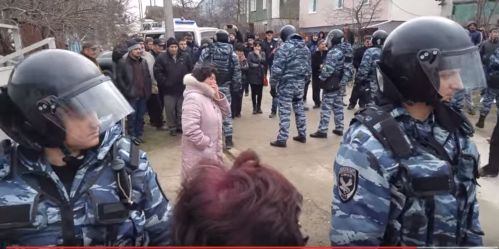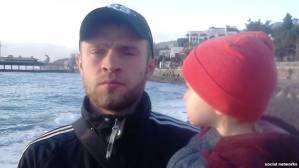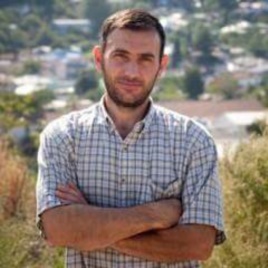FSB armed terror, torture & lawlessness against Crimean Muslims
 Search on Feb 11
Search on Feb 11
Armed searches are continuing in Russian-occupied Crimea with torture methods used against at least one Crimean Tatar. More details have also emerged of the four Crimean Muslims remanded in custody, though none that could possibly explain their arrest. Vadim Siruk’s wife, who is expecting their second child, can find only one answer. She believes that her 27-year-old husband, a convert to Islam, was arrested so that the occupation authorities could claim that they are not targeting Crimean Tatars.

Vadim Siruk with his daughter
As reported, four men – Emir-Huseyn Kuku; Enver Bekirov; Muslim Aliev and Vadim Siruk – were detained on Feb 11 and remanded in custody the following day. Their lawyer Emil Kurbedinov says that the investigators presented no grounds to justify the men’s detention. All are accused of involvement in the Hizb ut-Tahrir movement which Russia, unlike Ukraine and most other countries, has decided is a ‘terrorist’ organization and banned. There is no evidence that any of the men, all of whom have young families, is a member of Hizb ut-Tahrir.
Emir-Huseyn Kuku is the son of a veteran of the Crimean Tatar national movement and a member of the Crimean Contact Group on Human Rights, monitoring the human rights situation in the Yalta region. His wife Meryem told Radio Svoboda that her husband paid attention to everything and always tried to help in highlighting rights abuses.
This is a dangerous activity in Russian-occupied Crimea and he has faced constant harassment since Russia’s annexation, though never over Hizb ut-Tahrir.
He was first detained in April 2014 and later posted photos of the marks from beating he had received. From the Spring of 2015 he was repeatedly subjected to interrogation, as was his wife. On April 20 Russian FSB officers burst into his home and after carrying out a search, took him away for questioning – and beating. Since then he has complained of bad pain around the kidneys. Charges were initiated over alleged ‘extremism’, all supposedly pertaining to material posted or simply reposted on his Facebook page. (more details here)
Kuku has two children – a son who is just 9, and a 4-year-old daughter.

Muslim Aliev has four children, two of them with heart conditions. One daughter may need a very expensive operation. Aliev in fact became a practising Muslim when his daughter fell gravely ill. His wife Nadzhiye asks who else they could turn to but Allah when such a misfortunate befell them. He is the only breadwinner in the family, and has been working at several jobs to pay for the medical treatment needed.
53-year-old Enver Bekirov has three children, two of whom are still underage. His wife sees no explanation except that he is an active member of the local Muslim community.
There was at least one armed visitation, though probably more on Feb 18. Emir Kurbedinov told TV ATR that armed men had turned up at 6.30 a.m. at the home of Akim Bekirov in a suburb of Simferopol. Bekirov and his wife were away. There were two children there, aged 12 and 15, seemingly with their elder sister and her husband.
The website 15 Minutes reports an unnamed source as saying that Bekirov’s brother and elderly parents came immediately but were not allowed into the house. The search was carried out without official witnesses, and the children are totally traumatized. All technical equipment was removed, together with books and disks. The source said that the parents are now worried about returning, fearing arrest.
All of this took place without even the pretence of legality and no protocol or other documents were left.
Damir Minadirov recounts his experience two days earlier. Masked men in full military gear began hammering on his door at around 7 a.m. on Feb 16. They produced, when asked, a court order which spoke of possible involvement in a terrorist organization banned in Russia. Minadirov knows his rights, and points out how they were all breached. The official ‘witnesses’ came together with the FSB and Minadirov was not allowed to be present while the search upstairs took place.
He said that he wanted to add comments to the search protocol, listening all the infringements, but they refused to let him, saying he could make a separate statement. They took away a phone, address book, diary as well as various books on Muslim subject matter, none illegal.
He was then taken for interrogation with the questions mainly about religion, as well as about the four men who are in custody – where he had met them, what they’d talked about, etc.
Most worryingly, he was forcibly brought back after refusing to answer questions in accordance with Article 51 of the Constitution which gives him the right to refuse to give testimony. They pulled a bag over his head to restrict oxygen and handcuffs on, and openly threatened him.
They did not receive the information they wanted, and finally – when it was already dark – released him.
Russia has never provided any evidence to back its ban on Hizb ut-Tahrir as ‘terrorist’. Indeed, for that reason, the Memorial Human Rights Centre considers all those imprisoned for involvement in the movement political prisoners.
In this case, there is nothing at all to suggest that the men are members of the movement. In Russian-occupied Crimea, being Muslim is seen as close enough.





